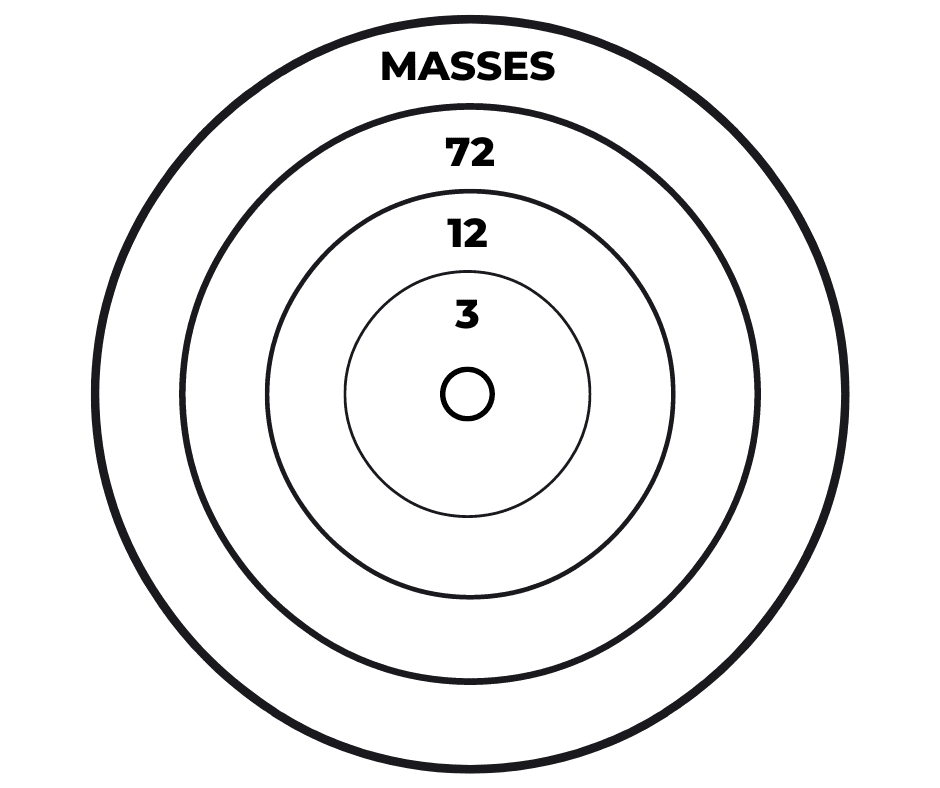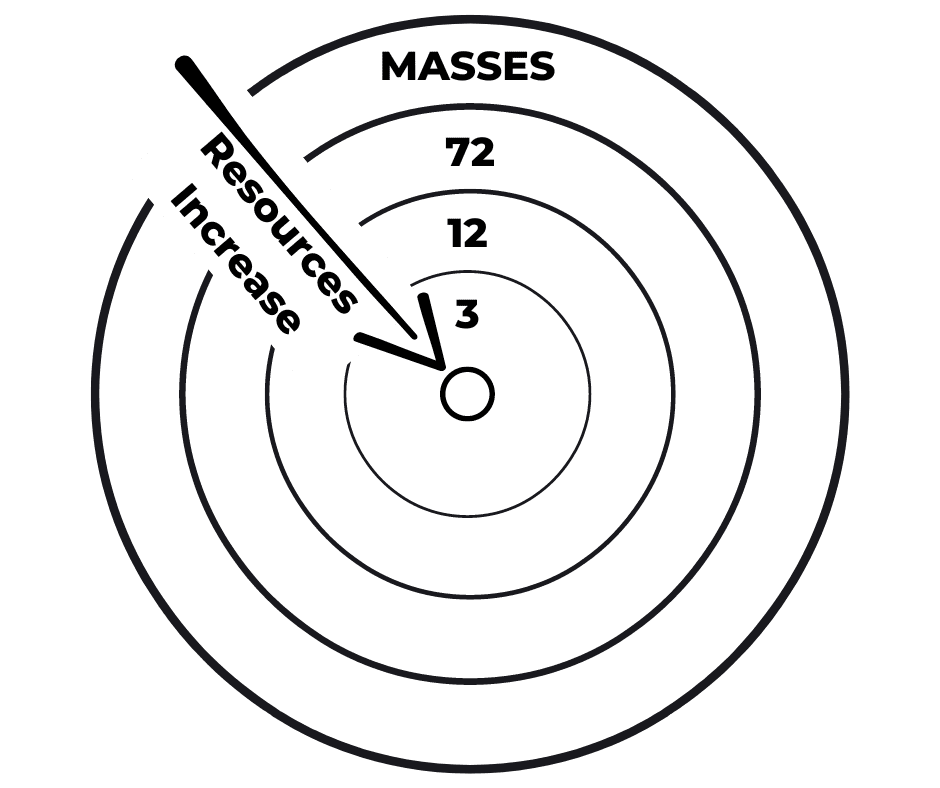How Jesus Allocated Ministry Resources (EDITed)
So at this point, you might be asking, wasn’t the purpose of getting all those volunteers to make my ministry more sustainable? And now you are telling me that I need to also give more resources to my volunteers on top of what I am already giving? That’s crazy!
No, this isn’t what you should be doing! What you should be doing is even more extreme.
Let’s look at how Jesus allocates the resources in his own ministry.
Jesus expended his resources on people in this order:
- The 3: Jesus spent the largest amount of resources on the 3; Peter, James & John.
- The 12: The next largest amount of time and energy was spent on the 12 Disciples.
- The 72: Then Jesus spent time teaching and training the 72.
- The Masses: Jesus spent the least amount of time on the masses.

The Masses: While Jesus loved the masses, the people in the crowds ultimately got less personalized teaching and training from Jesus. The masses committed to Jesus the least. They showed up for a free snack and listened to a sermon. They came for healing and then went home.
Like at the sermon on the mount, Jesus teaches these people how to live a Godly life in the occasional sermon, then He dismisses them – much like you dismiss Sunday Service.
Jesus would explain in parables to the crowd and further explain to his disciples the meaning when they were alone.
Jesus commits the least resources to the masses that follow him. He even tries to get away from them to rest!
When Jesus did call someone in the masses to follow Him, he asked them to leave everything behind to follow him.
To those who refused to take the necessary action (like the rich young ruler), Jesus went on his way without them.
Jesus did not double down, chase the rich young ruler, or put on an expensive event to get his attention back.
If a member of your audience is unwilling to commit their resources to you and your ministry, you are not obligated to commit yours to them – beyond what you would commit to the masses normally.
The 72: Jesus expended more of His resources on the 72, appointing, teaching, and training them than he spent with the masses. The 72 were willing to sacrifice more of their time, effort, and energy with Jesus than the masses were.
Jesus asks the 72 to commit more to his ministry than he asked of the masses. Said another way, Jesus asked them to sacrifice more for his ministry than he asked of the masses.
Commitment & Sacrifice are synonyms
If you aren’t asking those you are disciplining to sacrifice/commit on a higher level than the masses, you are doing ministry wrong.
Jesus prepared the seventy two and gave them a task that required a higher level of faith, sacrifice and commitment.
“Go! I am sending you out like lambs among
wolves. Do not take a purse or bag or sandals…” Luke 10:3-4
This would have been a scary call to action for the 72. This would have been a leap of faith for them to embark upon.
Jesus prepared them and asked them to sacrifice/commit equally.
The 12: Of course Jesus spent even more time with the 12.
Jesus spent his life, day and night teaching and training the twelve.
He is ultimately preparing them to take over the advancement of His church.
The 12 will also sacrifice their lives for the Church – and Jesus ministry.
Jesus’ commitment and sacrifice to the 12 was greater than that of the 72. The 12 also committed and sacrificed to Jesus more than the 72.
We know that Jesus taught more to the 12 than to the masses and the 72 as it is indicated in the passage below:
“While a large crowd was gathering and people were coming to Jesus from town after town, he told this parable: “A farmer went out to sow his seed. As he was scattering the seed, some fell along the path; it was trampled on, and the birds ate it up. Some fell on rocky ground, and when it came up, the plants withered because they had no moisture. Other seed fell among thorns, which grew up with it and choked the plants. Still other seed fell on good soil. It came up and yielded a crop, a hundred times more than was sown.”
When he said this, he called out, “Whoever has ears to hear, let them hear.”
His disciples asked him what this parable meant. He said, “The knowledge of the secrets of the kingdom of God has been given to you, but to others I speak in parables, so that,
“‘though seeing, they may not see;
though hearing, they may not understand.’
“This is the meaning of the parable: The seed is the word of God. Those along the path are the ones who hear, and then the devil comes and takes away the word from their hearts, so that they may not believe and be saved. Those on the rocky ground are the ones who receive the word with joy when they hear it, but they have no root. They believe for a while, but in the time of testing they fall away. The seed that fell among thorns stands for those who hear, but as they go on their way they are choked by life’s worries, riches and pleasures, and they do not mature. But the seed on good soil stands for those with a noble and good heart, who hear the word, retain it, and by persevering produce a crop.” Luke 4-14
After Jesus had prepared the 12, he sent them out on a task that would require even more faith than what was required of the 72.
“Calling the Twelve to him, he began to send them out two by two and gave them authority over impure spirits. These were his instructions: “Take nothing for the journey except a staff—no bread, no bag, no money in your belts.” Mark 6:7-8
“Do not get any gold or silver or copper to take with you in your belts— no bag for the journey or extra shirt or sandals or a staff.” Matthew 10:9-10
While He had asked the 72 not to take money, a purse, or sandals, He practically asked the disciples to go with nothing but the clothes on their back!
When Jesus made a greater commitment to the disciples, He also required more sacrifices from them.
The 3: Finally, Jesus committed the most to the 3: Peter, James, and John.
They were the only ones He took to the transfiguration on the Mount, where they received exclusive insight into Jesus’ life and identity.
Of course, the 3 didn’t get extra commitment from Jesus for free. They were ultimately given more responsibility than the other Disciples – they were asked to make a greater commitment with greater sacrifices.

Resource Allocation & Incentivization
When you allocate the majority of your ministry resources to the masses, you are basically throwing pearls to swine. Don’t make your greatest commitment to those who are the least committed to you.
Instead, increase the amount of resources you give as church members increase their commitment to you. This will be an incentive for new churchgoers to get involved in your ministry if they wish to get more of your time.
It’s like saying, “the more you commit to us, the more we commit to you.”
This begins a cycle where the pastor can focus on teaching, training, and discipling staff/volunteers, and as a result, they will prevent burnout by reducing the workload. Not only this, but they will be excited to make sacrifices for you because their needs are being met 2X to 4X more than they are meeting yours. It’s a win-win.


Leave a Reply